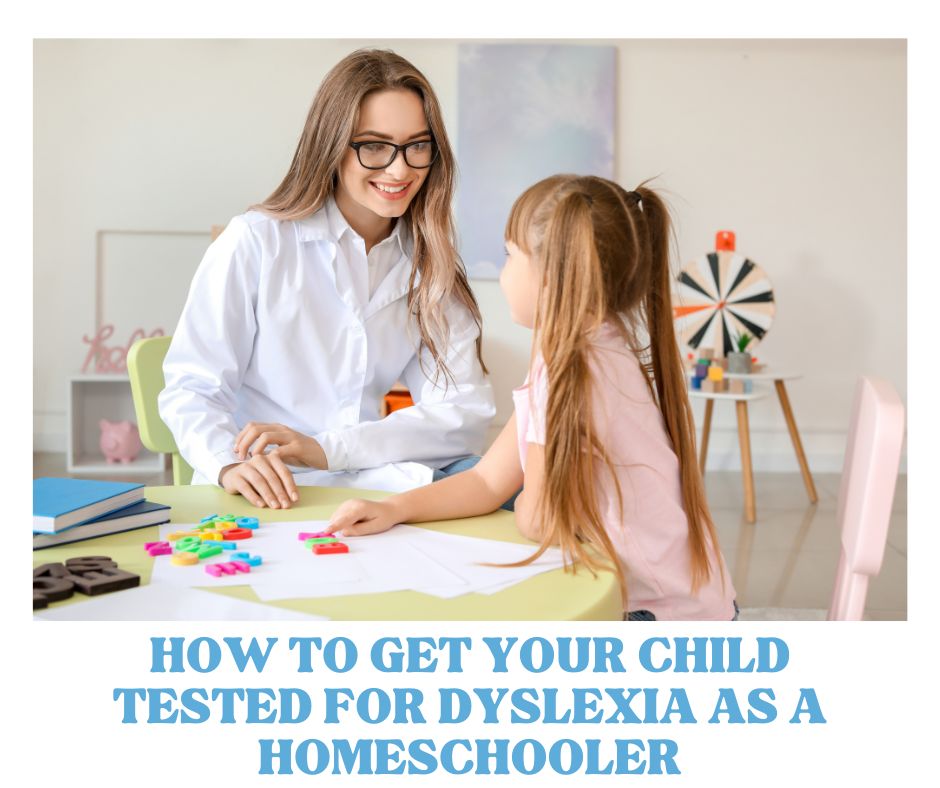If you’re a homeschooling parent and you suspect your child may have dyslexia, it may be helpful to seek a formal evaluation. But how do you do that if you’re not part of the public school system—or don’t want to go through it? Many parents face this same question, and the answer isn’t always simple. Let’s walk through your options, what to expect, and how to find the right kind of help for your child.

Why Not Just Get Dyslexia Testing Through the Public School?
Some homeschoolers choose to pursue testing through their local public school district, but the process can be long, confusing, and often frustrating. Here’s why:
- Schools don’t diagnose dyslexia. Public schools do not provide a medical or psychological diagnosis. Instead, they evaluate whether your child qualifies for special education services under the Individuals with Disabilities Education Act (IDEA).
- The process can be slow. From the time you make a written request, the school has 60 days (in most states) to begin testing—then additional time to meet and review results.
- Testing may not be comprehensive. Schools often use minimal academic screeners rather than deep assessments designed to detect dyslexia specifically.
- You may face resistance. Some schools are still reluctant to use the word “dyslexia” at all, even though federal guidelines allow it.
If you’re homeschooling and want answers—real answers—you may find a private evaluation to be the faster, clearer path.
Why Get Your Child Tested for Dyslexia?
Even if you’re already providing a supportive homeschool environment, a formal diagnosis can be incredibly valuable:
- It provides clarity about why your child is struggling.
- It helps you tailor your teaching methods using research-backed approaches.
- It can unlock access to accommodations (like extra time on standardized tests or speech-to-text tools).
- If your child enters high school, college, or the workforce, documentation of dyslexia may be important.
What Does Dyslexia Testing Include?
A comprehensive dyslexia evaluation should look at multiple aspects of your child’s learning profile. This often includes:
- Cognitive Testing: Looks at memory, processing speed, reasoning, and attention.
- Academic Achievement Testing: Measures reading, spelling, writing, and math skills.
- Phonological Processing: Assesses how well your child understands and manipulates the sounds in words.
- Rapid Naming and Working Memory: Both common areas of struggle for students with dyslexia.
- Reading Fluency and Comprehension: Measures how quickly and accurately your child reads and understands text.
Tests often used include the WIAT, WJ-IV, CTOPP, GORT, and others. The evaluator should not only give scores but also interpret patterns and explain how they align with dyslexia.
Who Can Diagnose Dyslexia?
To get a formal, credible diagnosis, you’ll want a professional who is licensed and experienced in learning disabilities. Some common types of qualified professionals include:
- Educational psychologists
- Neuropsychologists
- Licensed clinical psychologists with experience in learning differences
- Dyslexia specialists certified in assessment (in some states)
Note: Not all tutors or reading specialists are qualified to diagnose dyslexia, though they may offer helpful screening tools.
How to Find a Dyslexia Tester Near You
Here are some ways to locate the right professional:
- Search the IDA Provider Directory
Visit the International Dyslexia Association’s directory:
https://dyslexiaida.org/provider-directory - Ask in local homeschool or dyslexia support groups
Other parents are one of your best resources. Ask who they used and what their experience was like. - Contact local universities with psychology departments
Many offer low-cost evaluations through graduate student training clinics. - Check with private learning centers
Search for “dyslexia testing” or “learning evaluations” along with your city or region. - Ask the right questions when calling:
- “Do you have experience diagnosing dyslexia specifically?”
- “What assessments do you use?”
- “Do you provide a written report with actionable recommendations?”
- “Do you offer sliding-scale fees or help with insurance reimbursement?”
How Much Does Private Dyslexia Testing Cost?
Private testing can range from $1,000 to $5,000, depending on your location and the provider’s credentials. Some centers offer payment plans, and some insurance policies may reimburse part of the cost. University clinics often offer reduced rates between $200–$600.
Final Thoughts
As a homeschooling parent, you’re in a unique position to observe your child closely and make swift changes when something isn’t working. If you suspect dyslexia, don’t wait for the school system to catch up—trust your instincts and seek out answers. A good evaluation will not only give you clarity but also empower you to teach your child in the way they learn best.






0 Comments